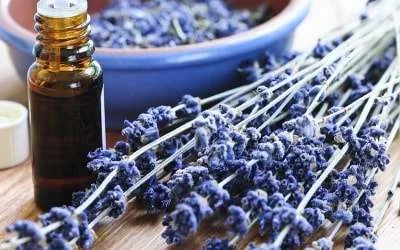Learn safe use of Aromatherapy oils and their production
This aromatherapy course is aimed at the introductory level of education in Aromatherapy. It is suitable for those wishing to gain knowledge of using Aromatherapy in the home or for those working in a related discipline.
Knowing the botanical names of plants and how they are derived is an important part of Aromatherapy. Most people know essential oils by their common names, such as Lavender, Thyme or Eucalyptus. For instance, there are several different types of plant that are commonly known as Lavender, and more than one of these plants are used to produce lavender oil. Oil distilled from True Lavender, or Lavandula angustifolia, is the highest quality lavender oil. However, lavender can also be distilled from Lavandula x intermedia and Lavandula latifolia. All three smell very similar, and can even be confusing for an experienced aromatherapist, but the chemical composition of Lavandula angustifolia is far superior to the other two species and is a much better therapeutic oil.
Study aromatherapy online with practical tasks in the course.
Aromatherapy Course Aims
- To develop a basic understanding of the safe use of aromatherapy oils and their production.
- Describe the classification system used for naming plants and to be able to identify the family, genus and species names of plants used to produce essential oils.
- To define aromatherapy and its history and to understand how aromatherapy works, and the basic chemistry behind it.
- Identify a range of essential oils and their uses.
- Ensure that essential oils are used in a safe and controlled manner.
- Identify what can be used as a carrier for essential oils and why they must be used.
- Describe methods which can be used to grow, and harvest herbs used in essential oil production.
- Describe methods used to extract essential oils from plants.
- Identify herbs and oils acknowledged as hazardous to people, and which should not be used in aromatherapy, or with great care.
Detailed Course Outline
There are 8 lessons in this course:
- Plant Classification
- Understand the classification system
- Plant names and plant phyla
- Be able to identify the family, genus and species names of plants
- Pronunciation of Latin names
- Chemistry of herbs and chemical compounds
- Acids, bases and tannins
- Introduction to Aromatherapy
- Origins of aromatherapy
- Define aromatherapy and its history
- Top notes and middle notes
- Natural chemicals in plants
- Essential Oils
- Benzoin – Styrax benzoin
- Bergamot – Citrus bergamia
- Cedarwood – Cedrus atlantica
- Chamomile, Roman – Anthemis nobilis
- Chamomile, German – Matricaria Chamomilla
- Clary Sage – Salvia sclarea
- Eucalyptus – Eucalyptus globulus
- Frankincense – Boswellia carterii
- Geranium – Pelargonium graveolens
- Juniper – Juniperus communis
- Lemon – Citrus limon
- Lavender – Lavandula angustifolia
- Sweet Marjoram – Origanum majorana
- Orange, Bitter – Citrus arantium amara
- Orange, Sweet – Citrus arantium sinensis
- Peppermint – Mentha piperita
- Rose Otto – Rosa centifolia
- Rosemary – Rosmarinus officinalis
- Sandalwood – Santalum album
- Tea Tree – Melaleuca alternifolia
- Sweet Thyme – Thymus vulgaris
- Ylang Ylang – cananga odorata
- Australian Bush Remedies
- Safe Use of Essential Oils
- How essential oils work
- Inhalation
- Absorption
- Quantities to use
- Blending
- Children
- During pregnancy
- For animals
- Carriers
- Using carriers
- Sweet Almond oil
- Apricot Kernel oil
- Avocado oil
- Canola oil
- Oil burners
- Carrier oils, creams and lotions
- Growing and Harvesting Herbs for Essential Oil
- Cultivation of herbs
- Traditional plant row spacings
- Storage of plant parts used for vegetative propagation
- Harvesting material for medicinal use
- Harvest of selected herbs
- Expected yields of selected herbs
- Harvesting herbs for essential oils
- Post harvest handling of herbs
- Post harvest preservation
- Methods of Extraction
- Introduction
- Water Distillation
- Steam Distillation
- Maceration
- Effleurage
- Expression
- Fixatives
- Herbal Preparations
- Preparing Teas, Rinses and Baths
- Preparations using different herbs
- Decoction
- Hazardous Herbs and Oils
- Introduction
- Carcinogens
- Photosensitisers
- Allergens
- Hormone Like Affects
- Teratogens
- Cellular Respiratory Inhibitors
- Cathartics
- Abortifacients and Irritants
- Alkaloids; types
- Toxic Amino Acids
- Glycocides
- Terpenes
- Plant Acids
- Poly-ynes
- Furanocoumarins
- Proteins
Each lesson culminates in an assignment which is submitted to the school, marked by the school’s tutors and returned to you with any relevant suggestions, comments, and if necessary, extra reading.
When you have completed the lessons of your Certificate course, you will be given the option of taking the optional exam. It’s okay if you don’t want the exam, we still issue your Careerline Certificate. For Advanced Certificates however, the exam is compulsory (per module) and are included in the course fee.

